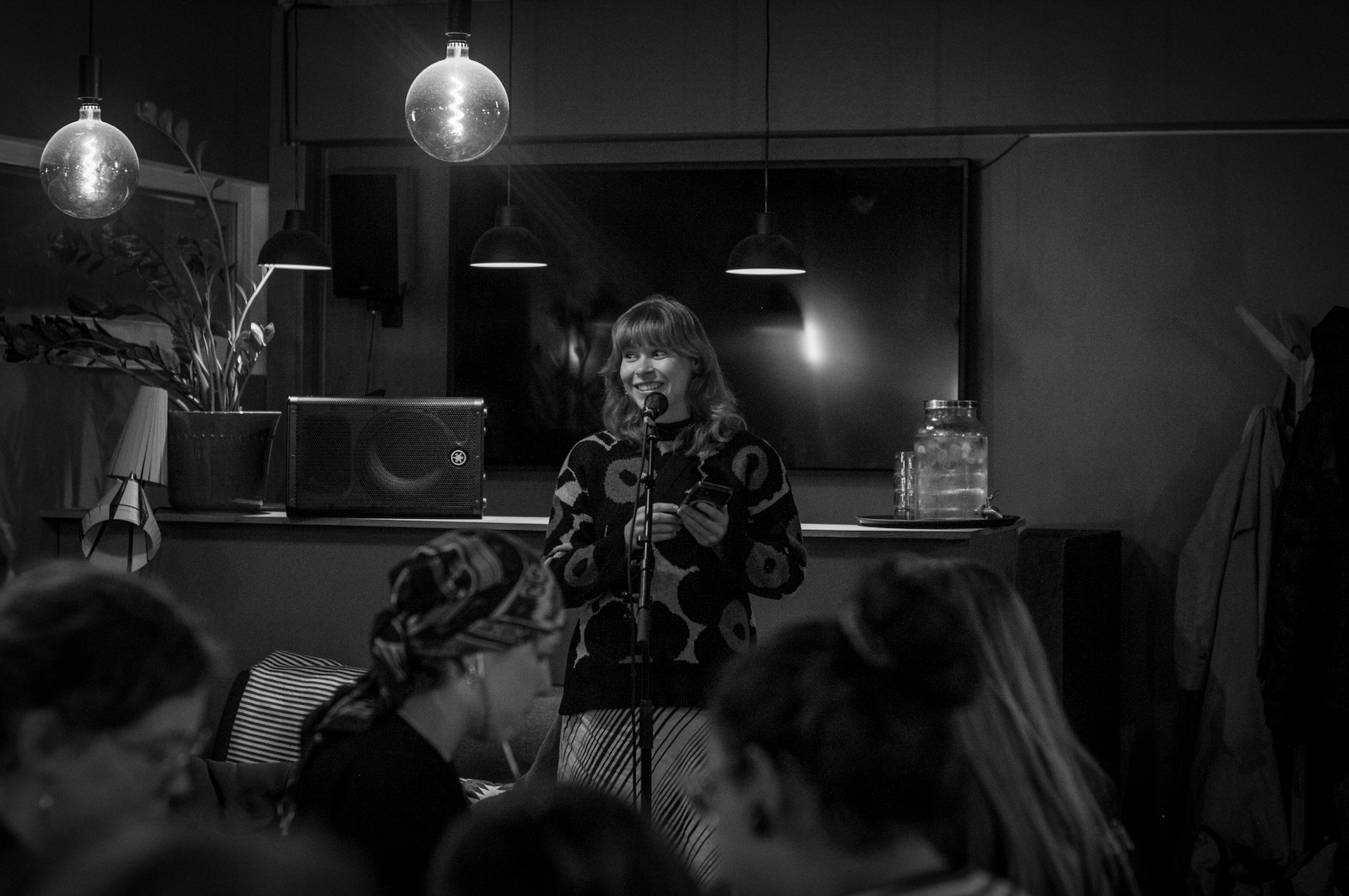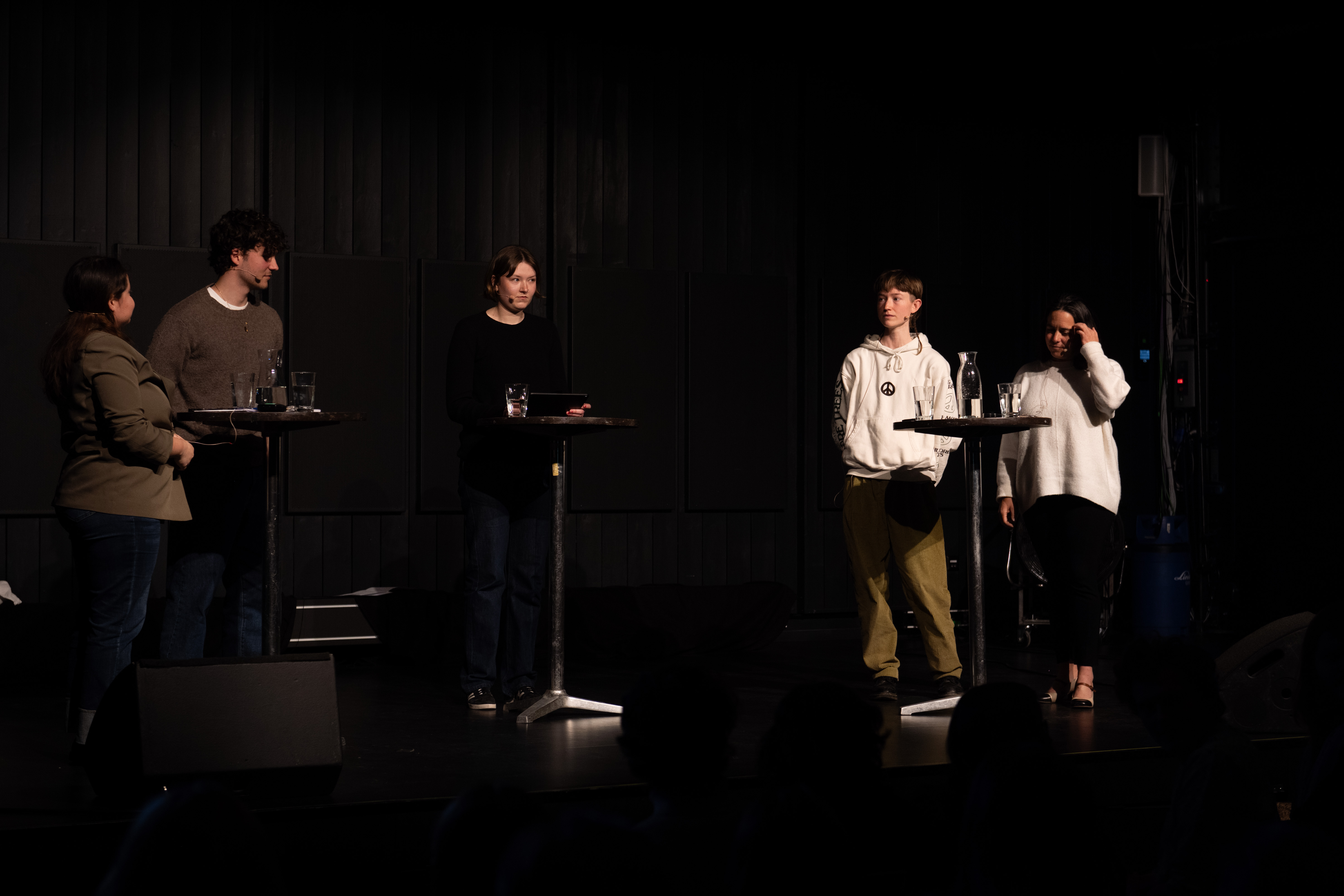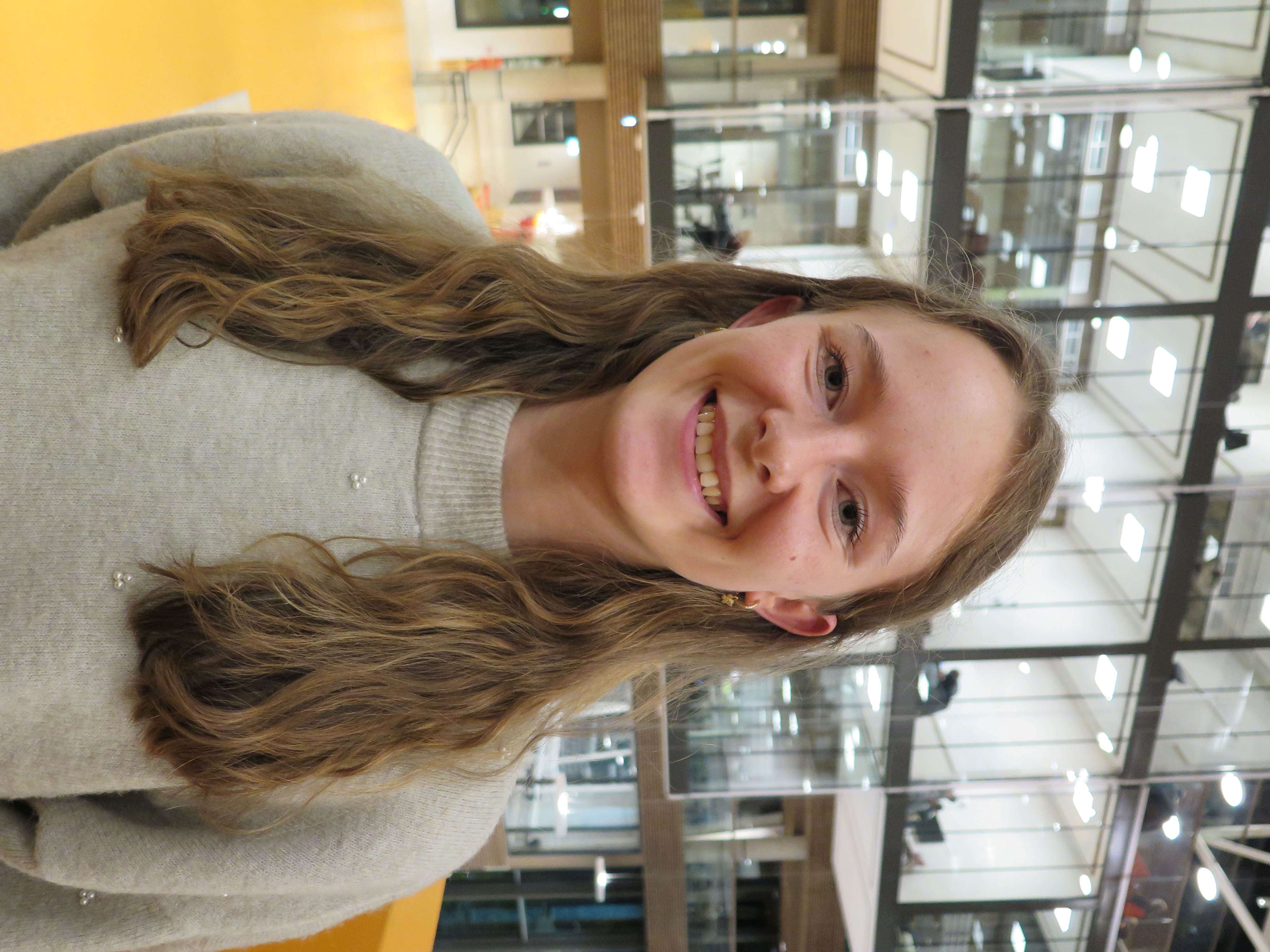Welcome to the ISFiT blog!
ISFiT is a celebration of ideas, cultures, and connections. Here on our blog, you’ll find stories from the festival, behind-the-scenes insights, and reflections from participants and volunteers. Stay tuned for updates and get a taste of the festival spirit!
Read more about the theme.png)
Finding Power - The Future With AI
Storsalen was drenched in red lighting and buzzing anticipation as the many attendees were waiting for the debate to kick off. In Thursday’s debate, Finding Power: The Future With AI, members of the panel, and also the audience, asked important questions and challenged established narratives, in an attempt to demystify the conversation around AI. The general message? We need to stop sitting on the sidelines.

The debate was introduced by keynote speaker Dr. Christina Colclough. In her speech, Colclough addressed ___
After the keynote speech, the audience was given 10 minutes to discuss and send in questions to the following panel discussion.
The panel discussion, moderated by ISFIT debate manager Fredrik William, included the following members:
- Keynote speaker Dr. Christina Colclough, a large voice within the fields of labour movements and the politics of digital technology, as well as their intersections.
- Anders Eidesvik, an advisor at the politically independent organisation Langsikt and a journalist, writing for some of the biggest media houses in Norway. The topic of AI is centrestage in a majority of Eidesvik’s analyses and articles.
- Dr. Hans Jørgen Gåsemyr, a senior researcher at the Norwegian Institute of International Affairs (and previous ISFIT-er!). Dr. Gåsemyr’s research is concentrated on Chinese domestic and international politics.
- Dr. Jenia Jitsev, a computer scientist, neuroscientist, and machine learning researcher. Dr. Jitsev is the scientific lead and co-founder of LAION (Large-Scale Artificial Intelligence Open Network), a German non-profit research organization committed to collaborative, open science around machine learning and AI.
In response to a question from the audience, Dr. Colclough stated that we have to “reinvent democracy” to protect our rights against AI-abuse, a good transition into Friday’s debate: Democracy: Yay or Nay?
Powerful joik from Ella Marie at Skala

“Joik is alive!”
Ella Maries concert at Skala on Thursday can only be described as a powerful, moving and special experience. With all songs but one being sung in northern Sámi and her strong vocals - which Ella describes as her heart language - it is impressive how she moves and touches an audience who doesn’t understand the words. Her delivery of the songs and joiks, and her energetic presence on the stage makes it hard not to pay attention, dance and have a good time.
She kicks off the concert with a powerful joik about the wolf, which she explains symbolizes the authorities. Following the power vibe, she sings what she calls a power joik for the women, which gets the crowd going. She then calms down the mood, with a calm and vulnerable song about the feeling of emptiness after a protest. Having started out as a protester for Sámi rights, before becoming a solo artist, is apparent in her songs, and she has several political statements to make during the concert. She acknowledges the conflict in Gaza, and says that she stands in solidarity with Palestine. “When I don’t have words, I have joik”, she says, and sings a joik for the children of Palestine.
Joik is the traditional Sámi music, and is usually dedicated to a person, to nature or to an animal. Ella Marie raises the concern that the joik is a dying tradition, and that she is here to prove it is still alive. She sings a beautiful joik about the crow a capella, which makes the crowd go quiet. Her activism also is apparent here, as she explains that the crow is a symbol for the police.
Ella Marie ends the concert on a lighter note, with songs that make you want to dance and have a good time - just like her, dancing, jumping and having fun on stage in her red, glittery jumpsuit. As I walk out of the concert venue, I see smiles all around, and I feel empowered by the strong, vulnerable, fun, provoking and engaging concert experience that Ella Marie delivered.

Movie Screening: Once upon a time in a forest
On a rainy Thursday evening in Trondheim, the movie Once Upon a Time in a Forest, or Havumetsän Lapset, was showcased at the Vuelie. Directed by Virpi Suutari, the film follows a group of young, dedicated Finnish environmentalists in their fight to preserve Finland’s vast forests from industrial exploitation.
Despite the rainy weather, a few dedicated film enthusiasts were present from the start, and as the screening progressed, more attendees joined. Those who came were rewarded with the opportunity to witness a compelling and thought-provoking film. The intimate setting created a unique and engaging atmosphere, allowing the audience to fully immerse themselves in the story.
Led by Ida Korhonen, the young environmentalists were not afraid to cause disruption for their cause. Throughout the film, Ida is repeatedly seen exiting the local prison in Rovaniemi after various activism-related arrests. Once Upon a Time in a Forest is a deeply ideological film that provokes thought. It highlights the grim reality that Finland’s deep forests are valued primarily for the profit they generate for the timber industry, rather than for their ecological significance. Activist Minka Virtanen expresses deep despair, stating that she “fears for her own future” if deforestation continues unchecked.
The film illustrates a generational divide: the older generation prioritizes business and short-term economic gain, while the younger generation fears the long-term consequences for nature and the future they will inherit. The older generation, after all, will not be around to face the fallout.
However, there is hope. By the end of the film, the young activists’ voices are heard, and an area of forest where they once protested is now protected. The screening concluded with light yet firm applause and contented smiles from the audience—a fitting end to a compelling spectacle.
And don’t forget: protect the forest!
EmPOWER Samf!
Tuesday, the whole house came together for Empower Samf, an event dedicated to youth activism. The evening was filled with a debate, workshops, courses and a movie screening, and with very engaged participants.
The debate kicked off the evening, filling almost every seat in Skala. On stage we had Antonio Gade Wilhelmsen Serri from Høyre, Arlen Alejandra Padilla Guerrero from IPEN, Dr. Jessica Taft, Professor of Latin American and Latino Studies, and Ragnhild Kvist Simonsen from Folk mot Fossilmakta. The debaters were also joined by the audience through Mentimeter and the final discussion round.
The debate was split into three rounds:
1. How to start a youth movement and why activism matters
2. Civil disobedience: Role, limitations and consequences
3. Audience concerns and open discussios
The first block was a relatively agreeable debate where everyone nodded along in agreement that activism is important, and the audience kept their questions to a polite minimum. In round two, the discussion got a bit more heated. Antonio (representing Høyre) and Ragnhild (from Fossilmakta) exchanged views on civil disobedience. Ragnhild argued that breaking the rules can sometimes be necessary for real change, and that democracies don't always work as flawlessly as they appear (cue historical references and revolution flashbacks). Antonio, on the other hand, meant that in a well-functioning democracy, voting and constructive dialogue should do the trick. The audience seemed skeptical about civil disobedience too, judging by their Mentimeter responses. However, Jessica supplied the debate with some hard-hitting facts backed by data: while civil disobedience might not be everyone’s cup of tea, it definitely works.
All in all, the evening was a success with an engaging debate with participants and the audience, in addition to great workshops, courses and a film afterwards 😊

"By understanding how power structures control us, we gain the power to change them"
- Aurora Kolstad, President of ISFiT25
Life is a very large piece of “Bløtkake”

Cake has the power to turn a grey Monday into a day of celebration. Monday the 17th of March, comedian Hilde Nygaard, brought her first solo show “Bløtkake” (eng: Cream Cake) to a packed Vuelie. Through song, laughter, and lots of audience interaction, Nygaard answered questions such as: How does the King wish you a happy 100th birthday? Is it possible to find Jesus in the basement of Samfundet? And what are we supposed to do with life?
Hilde Nygaard is a blooming Norwegian entertainer with a strong sense of musical comedy. The crowd at Vuelie consisted of both long time fans, many referring to her popular song snippets on social media, and audience members having their first experience with her comedy. Nygaard opens the show by explaining why she chose to name her first comedy show “Bløtkake”, pointing out how there is always a “Bløtkake” at the big celebrations in life, but no one ever celebrates the “Bløtkake” itself. In the show’s introductory song, she brings up the uncertainties with growing up, joking that “it is all alright as long as you have a job”, which caused audience members to laugh agreeingly to both the message and the melody. The show continues with many personal anecdotes from the comedian’s own life, joined by entertaining, musical numbers, eliciting laughter and sing-alongs from the enthusiastic audience. While the show includes many seemingly random elements, such as a song about gift cards and a moving rendition of Nicki Minaj, the show still manages to tie each element towards the overarching theme of ‘how to live life’, particularly brought together by the comedian’s ending commentary.
“Bløtkake” is a different, but important addition to this year’s festival and its theme “power”. Nygaard’s show succeeds in taking the larger events of life, which may seem heavy and overwhelming to many, and making them more lighthearted, less scary, and easier to carry. This is a valuable message and experience for many young people, who may feel powerless in the process of “growing up”, fearing that they have no control over their lives. In a time where the future is often painted black by media and public discourse, “Bløtkake” serves as a healthy reminder of the power we do yield in our own life. Perhaps more importantly, Nygaard reminds the audience that even when life does not go as planned, it is not the end of the world, and that losing control can be a good thing.
As for the question “what are we supposed to do with life?”, Nygaard's 105 year old friend Odd, who makes multiple, digital appearances throughout the show, answers:
"You have to figure that one out yourself"
NB! The show was performed in Norwegian. All translations have been rendered by the author.
"The goal of this mini-blog is to give you a glimpse into the heart of the festival, from inspiring moments to everyday experiences that make ISFiT so special. Whether you’re here in Trondheim or following from afar, we hope these stories bring you closer to the magic of ISFiT. Glad to have you with us—let’s make this festival unforgettable!"
- Kristina Nielsen, Head of Editorial

Silent Disco, Skala, 22.03.25

Livepod: Lørdagsrådet, Storsalen, 22.03.25

Skræng 23:59, Vuelie, 22.03.25

Knauskorets vårkonsert, Vuelie, 22.03.25

Panel Discussion on Political Art + (ART)erparty with DJ Safi, 22.03.25

Panel Discussion on Political Art + (ART)erparty with DJ Safi, 22.03.25

Invisible strings: Unmasking social norms, Lager 11, 22.03.25

Drag Show + DJ-set with Ayama Star, Storsalen, 21.03.25

ULD, Nidarosdomen, 21.03.25

Democracy: Yay or nay?, Storsalen, 21.03.25

A conversation about racism at Sellanraa, 20.03.25

Ella Marie Concert, Skala, 20.03.25

Finding Power - Future With AI, Storsalen, 20.03.25

Concert by Veslemøy Narvesen, 19.03.25

Poetry night, Habitat, 19.03.25

Snow Day, 19.03.25

Balancing the future: Climate Choices and Compromises, 19.03.25

EMBL 2025 Kafatos Lecture with May-Britt Moser, Storsalen, 18.03.25

Bingobad with Torill Tombola, outside Huset, 18.03.25

EmPOWER samf debate, 18.03.25

Non-Violent Direct Action Course, 18.03.25

Participant Day: Danceshow, Storsalen, 16.03.25

Silent Night, Nidarosdomen, 16.03.25

Student Peace Prize Ceremony, Olavshallen, 16.03.25

Walk of Peace, 16.03.25

Walk of Peace, 16.03.25

Opening Ceremony, Storsalen, 14.03.25

Opening Ceremony, Storsalen, 14.03.25

Workshops











